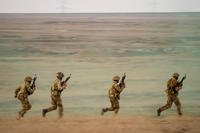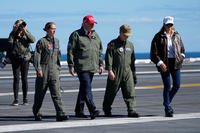This November, the Marine Corps plans to introduce a new phase to boot camp designed to better define newly minted Marines as leaders and equip them for their new role in the fighting forces.
The introduction of a fourth phase directly after the grueling Crucible test will come at the end of a year in which the Corps has been rocked by high-profile disciplinary problems within the force, from drill instructors going to trial for hazing recruits to a Facebook page in which active-duty Marines shared nude photos of female service members without their consent.
Just this week, news stories revealed a crackdown on hazing within the operating force that has led to criminal charges for a number of Marines.
The new phase, a roughly two-week period following the ceremony in which recruits receive their traditional Eagle, Globe and Anchor pin and earn the title of Marine, will bring with it a change in the balance of power between drill instructors and their charges.
Related content:
- Marines Kick Out 15 Troops in West Coast Hazing Crackdown
- Emergency Landing as Marine Super Stallion Catches Fire Over Okinawa
- In First, Marines Deploy Counter-Drone Task Force in Middle East
For recruits, drill instructors are imposing figures who bark orders and are addressed exclusively as "ma'am" or "sir."
In the fourth phase, these drill instructors will transition into a peer leadership role where they mentor the newly made Marines and discuss the realities of life in the fleet.
"So now you've got somebody who's been a drill instructor, who's been intimately involved with this transformation and now they have another few days to talk with their new Marines as a fellow Marine about what it's going to be like as they go out and begin the rest of their journey as a Marine," Commandant Gen. Robert Neller said in a brief video announcing the change, which was published to service social media accounts.
Peers in the Service
The primary goal of the change, initiated by a directive from Neller in early spring of this year, is to develop better-quality Marines who are more capable of transitioning from entry-level training to their new units, said Maj. Gen. Kevin Iiams, commanding general of Marine Corps Training and Education Command, in an interview with Military.com.
But by establishing new Marines as peers in the service, Iiams said he believes the move will reduce hazing and other mistreatment of Marines by Marines.
The only rites of passage for Marines are the Crucible or, for officers, Officer Candidates School and The Basic School, he said.
"You've passed the bar as far as the Marine Corps is concerned once you've gotten past there. So again, does it reinforce that message to the Marines? I think it really does," Iiams said.
"So anecdotally, I think it will have an impact down the road on reducing these types of things, because we're teaching the Marines right up front how important it is, who they are as a Marine, and how do they internalize that responsibility, that leadership model, throughout their career," he said.
Iiams said boot camp is not getting any longer to accommodate the new phase, and no additional programs of instruction are being added.
Rather, he said, existing curricula taught at the end of boot camp, including briefs on hazing, social media use, financial seminars and other information designed to prepare Marines to enter the force, will be rebranded.
'Six Fs'
The information will now be taught in the context of a "six Fs" construct developed by the Lejeune Leadership Institute within Marine Corps University: fighter, fidelity, fitness, family, finances and future.
"We want to improve our Marine Corps and their warfighting lethality so they can be reflected upon by our nation as a force in readiness," Iiams said.
"We want to develop young men and women who, when they are going to be returning to civilian life, are men and women of character," he said. "They are the best friends you could ever want, as well the best family members you could want."
Meanwhile, the Crucible, a 54-hour event designed to test recruits physically and mentally at the conclusion of their boot camp training, will retain its significance, Iiams said.
"It is no less grueling, no less demanding, no less defining in a young man or woman's life," he said.
"They will still be there at that quintessential moment in life with that Eagle, Globe and Anchor pressed into their hand," he continued. "And they will realize at that moment who they are, whether that happened a couple of days earlier or a couple of days later. It will still be the defining moment that it is."
Iiams said he expects to send a letter to the force to educate Marines about the changes taking place to boot camp and the purpose behind them.
It's possible the fourth phase is one of a number of changes coming to boot camp in the near future.
Assistant Commandant Gen. Glenn Walters has said the Corps is considering, among other things, more complete gender-integration of female and male recruits, and training female recruits for the first time at Marine Corps Recruit Depot San Diego, California, as well as Parris Island, South Carolina.
The Marine Corps has not yet publicly announced decisions on those possible changes.
-- Hope Hodge Seck can be reached at hope.seck@military.com. Follow her on Twitter at @HopeSeck.






























